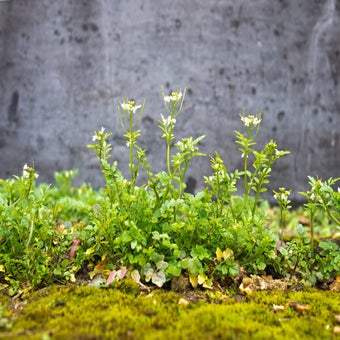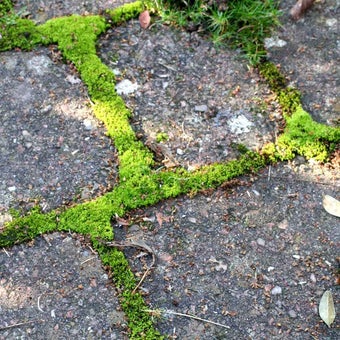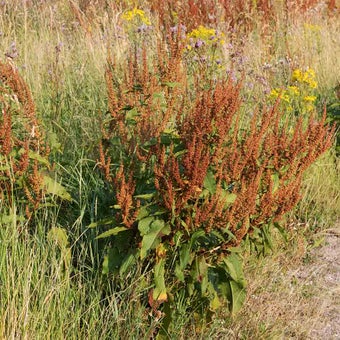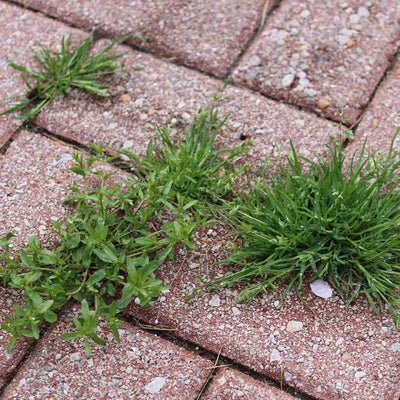
Quick facts
A variety of weeds can establish in paving cracks and the less worn areas of paths and driveways
Many gardeners embrace these weeds as they can soften hard landscaping, attract wildlife and boost the biodiversity of a garden
Weeds can make paths and driveways slippery and uneven, increasing the risk of trips and falls
If you need or wish to remove weeds from hard surfaces, non-chemical methods are effective
Which weeds grow on paths and patios?
Weeds on hard surfaces tend to be those commonly found in grassland and on waste ground, such as annual meadow grass, sowthistle and chickweed, and are often blown in as seed. You may also find creeping weeds, such as oxalis, speedwell and mind-your-own-business, spreading from an adjacent lawn or border. of border plants that self-seed readily, such as Stipa, Verbena and Alchemilla, can also be a nuisance on nearby hard surfaces.
Weeds that manage to germinate and establish on paths, patios and driveways are often restricted in size due to the poor growing conditions, shallow root run and regular foot traffic. Despite this, many still manage to flower and set seed.
What is a weed?
The term ‘weed’ describes a plant that is growing where it isn’t wanted. Weeds usually thrive in average garden conditions, reproducing and spreading easily. It is up to you to decide what you call a weed and what you choose to retain or remove.
Algae, lichens, liverworts and mosses may also grow on hard surfaces, especially those that are shaded for much of the day. See our page on these organisms for more information.
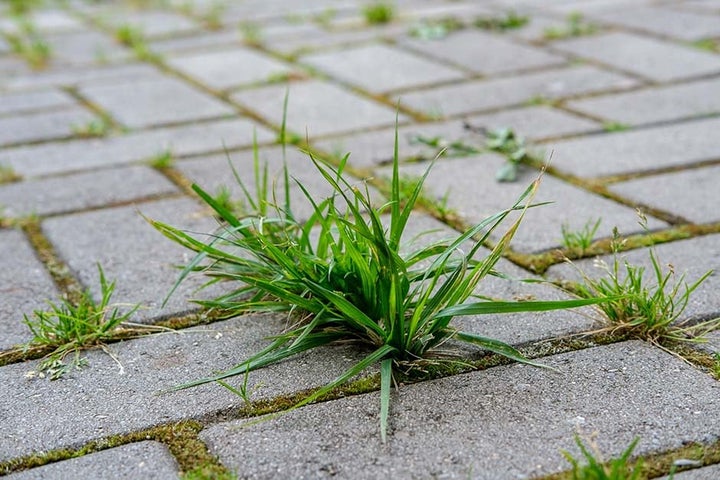
Do I need to get rid of weeds on hard surfaces?
No – most UK weeds are wildflowers that support a range of garden wildlife and allowing them to grow in places where they won’t outcompete plants, such as in paving and driveways, is a great way to boost the of your garden.
Many garden weeds have attractive flowers and foliage, and their presence can soften and even enhance hard landscaping. Indeed, gardeners can deliberately plant low-growing plants into driveways and paving to increase their growing space.
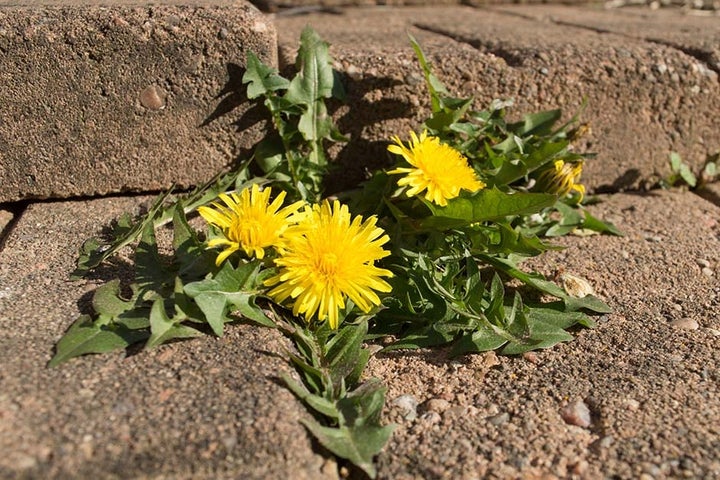
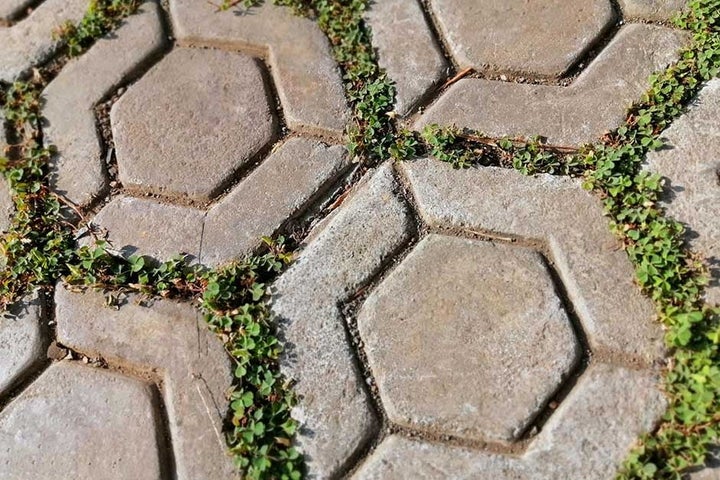
However, weeds growing in areas of foot traffic can pose a safety risk by making the ground uneven and slippery when wet. They may also be considered unsightly in formal gardens, making hard landscaping look unkempt.
How can I get rid of weeds on hard surfaces?
If you have weeds on your path, patio or driveway and want to get rid of them, try the following:
- Hoe loose gravel surfaces – slide the blade of a hoe under the surface of the gravel to kill annual weeds and weaken ones. Do this on a warm, dry or windy day so exposed roots dry out quickly. Repeat regularly during the for good control.
- Use a weeding knife – run the blade of a ‘block paving knife’ or ‘weeding knife’ along the cracks in paving to sever roots and use its hooked end to lever out weeds.
- Scrub off weeds – use a paving brush with angled wire bristles to scrub mosses, weed and debris from cracks and paving joints.
- Tackle weeds with taproots– use a specialist ‘dandelion weeder’ or ‘weed puller’ to tackle deep-rooted weeds like dandelions, dock and creeping cinquefoil. Where it isn’t possible to remove these from narrow paving joints, repeated removal of top growth will weaken and may eventually kill them.

Top Tip
Don’t add weeds with runners, taproots or seeds to your home compost bin, as it may not reach high enough temperatures to kill them. Instead, put them in your council green waste recycling bin or take them to your local recycling site.
If you have lots of weeds on the hard surfaces in your garden and are struggling to get on top of them, it may be worthwhile considering a longer-term solution:
- Embrace plant growth – plant low-growing ornamental plants, like Corsican mint, stonecrop sedum and creeping Jenny, into gaps in paving to hide and outcompete weeds. Even narrow joints can be planted up, by removing pieces of loose mortar, filling the gap with topsoil and sprinkling on the seed of creeping thyme or Mexican fleabane.
- Repoint paving to fill gaps – use a chisel and stiff brush to remove any loose pointing, then fill gaps with a dry mortar mix or ready-made jointing compound. Avoid walking on the area until the pointing has fully hardened. Staff at DIY retailers can advise on a suitable product. For large areas, consider hiring a hard landscaping professional.
- Re-lay areas using film – if you have a small, gravelled area where perennial weeds are troublesome, you could remove the stones and re-lay them atop a heavy grade biodegradable weed membrane. This will smother weeds, preventing photosynthesis, long enough for most to be killed off. The same method could also be used if you plan to extend an existing gravel path or patio.

Should I use weedkiller?
The RHS does not support the use of weedkillers and recommends that alternative control methods are used. However, we do note that when gardeners struggle to control plants with cultural methods, regulated weedkillers/pesticides for home gardeners are available for use legally. Garden centres and large retailers selling weedkillers have trained staff who can advise on suitable products for your needs.
Weed burners are sometimes recommended as an alternative to weedkillers, but they are not ideal, due to the risk of fire, the need for fuel or power, and limited effectiveness against deep-rooted perennial weeds.





